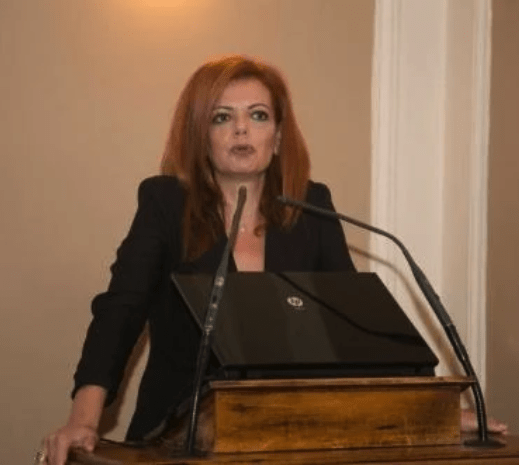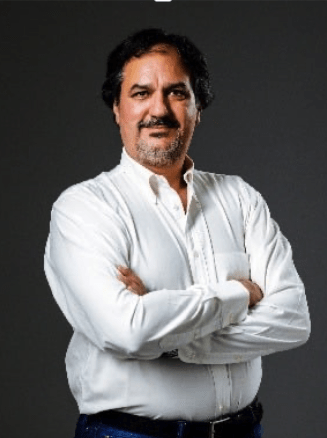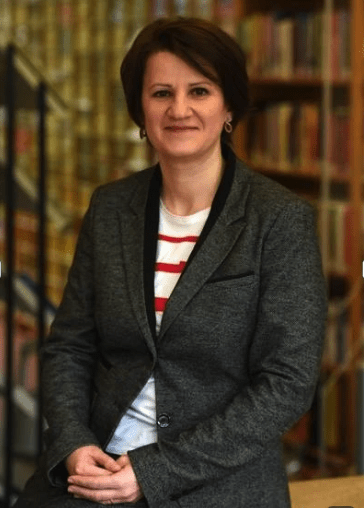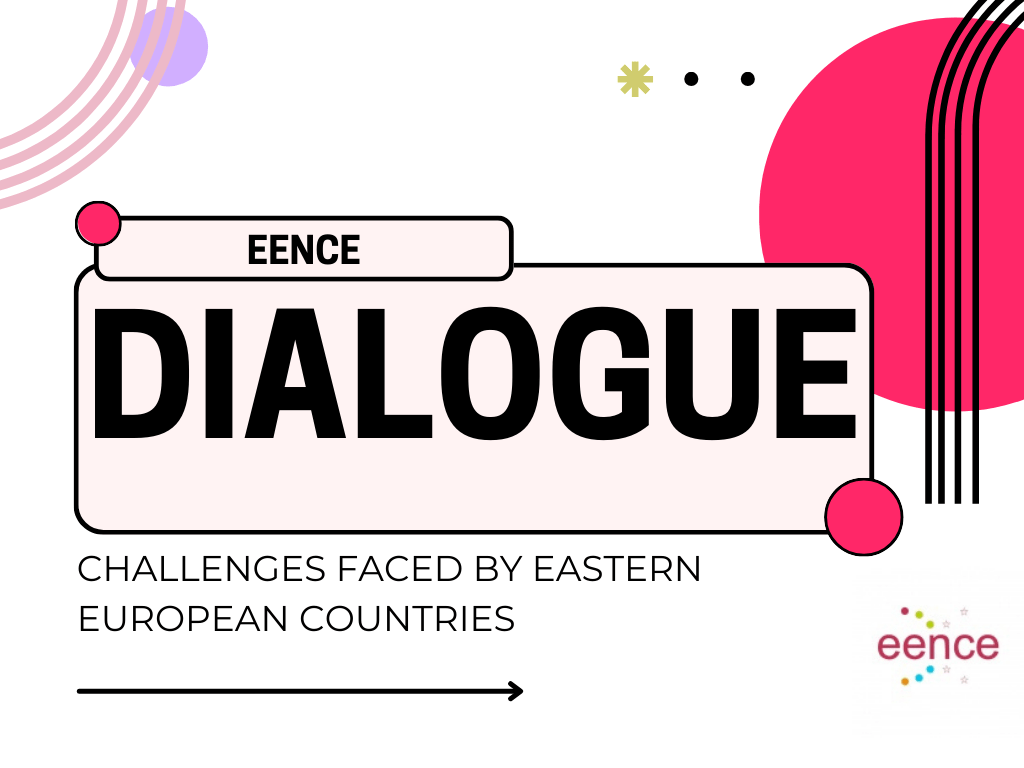EENCE Dialogue – 2024: challenges faced by Eastern European countries
Open dialogue, based on respect for the dignity of all participants and the resolution of conflicts in a peaceful way is one of the EENCE ‘s principles.
In 2024, as part of the EENCE Dialogue Strategy, we are launching a series of webinars. The main objective of these webinars is to facilitate the sharing of experiences between EENCE members and EU practitioners. The focus will be on best practices and innovative approaches to citizenship education.
Below is the tentative schedule for the webinars:
Citizenship Education in War, Conflict, and Post-conflict Zones
War, Migrants, and Refugees – New Challenges for Europe
Cultural Diversity of Europe – unity in diversity
Combating Populism and Propaganda in Eastern Europe
Inclusivity and Human Rights
The first Webinar ‘Peacebuilding and Education for Sustainable Peace in Eastern Europe’ will take place on 5 September (15:00-18:00 CEST).
Goals:
- Promote understanding of peacebuilding efforts.
- Discuss strategies for conflict resolution.
Moderator: Sergiu Musteata (Moldova).
Agenda:
- Introduction (15 minutes): Overview of Peacebuilding
- Keynote Speech (30 minutes): Maria Giannakaki, Adviser, European External Action Service
- Panel Discussion (45 minutes):
- Svetlana Suveica, Prof. Dr. hab., University of Regensburg
- Christos Petrakos lawyer, and legal expert at OSCE Office for Democratic Institutions and Human Rights (ODIHR)
- Q&A Session (30 minutes): Interactive session with attendees
- Workshop (45 minutes): Techniques and tools for community peacebuilding
- Evaluation and Follow-up (15 minutes)
Working languages: English and Russian (simultaneous translation)
Zoom link: https://us06web.zoom.us/j/88675224954?pwd=uNtwz7h55VFZZqPHhATo1g8bcnbvX2.1
ID: 886 7522 4954
Code: 283931
INFORMATION ABOUT SPEAKERS:

Maria Giannakaki is the adviser of the European External Action Service. She was the Director of the Press and Communication Office of the Permanent Representation of Greece at the Council of Europe, Ministry for Press and Mass Media of Greece, parliamentarian, Secretary of State for Human Rights, Head of the National Council Against Racism and Intolerance, OSCE, ODIHR Consultant against Racism and Intolerance, etc.
Nowadays she is a Lecturer on Human Rights, Peacebuilding, and International Cooperation in various Institutions in Greece and Cyprus and a Scientific Researcher at Aristotle University of Thessaloniki on Interreligious Dialogue and National Security. She published two books on Cyprus issues (Savvalas editions) and hundreds of articles on Communication, Human Rights, and Foreign Policy. Since 2014 she is the President of the Initiative “Solidary and Peace”.
Christos Petrakos graduated from the Montessori School of Athens and studied law in Lille, France, where he obtained a Maitrise de Droit Public. Between 2017 and 2019, he was the Special Coordinator of the OSCE/ ODHIR program with the Ministry of Justice, Transparency and Human Rights, “Building a Comprehensive Criminal Justice Response to Hate Crime” and this work was distinguished as the best within the program.
Since March 2019, he has been an OSCE/ODHIR Special Partner on Hate Crimes. Before becoming a lawyer, he was the Internal Audit Manager of INDEX A.X.E. for more than ten years. In recent years, he has served as president and vice president of companies in Greece and abroad and always remains a combative lawyer.


Svetlana Suveica, apl. Prof. Dr., is a historian of East and Southeast European history at the University of Regensburg and a research fellow at the Leibniz-Institute for East and Southeast European Studies (IOS) in Regensburg, Germany.
She studied history at the Moldova State University in Chisinau, completed her doctorate at the “Al. I. Cuza” University in Iași, Romania, and obtained the habilitation degree from the University of Regensburg (2021). She is a former Humboldt research fellow at IOS Regensburg (2012-2014) and a Fulbright research fellow at Stanford University, CA (2009-2010), the recipient of the research grants of the Fritz-Thyssen Stiftung (2015-2018) and the Carnegie Corporation, USA (2007-2009).
She researches and teaches on wars and post-war transformations of the East European society, with the focus on Moldova, Romania, and Ukraine. Her latest book, Post-imperial Encounters. Transnational Designs of Bessarabia in Paris and Elsewhere, 1917–1922 (Berlin, Boston 2022), dedicated to the post-imperial transition and nation-state building in the borderland regions of Bessarabia after World War I, has received the Book Prize of the Society for Romanian Studies and will be soon translated into Romanian.
ABSTRACTS
Maria Giannanaki, Peacebuilding and Education for Sustainable Peace
The topics to be discussed include the meaning of the peacebuilding process from both a theoretical and practical perspective, the connection between peacebuilding and social cohesion, as well as examining historical and current instances of war and frozen conflicts.
It’s important to delve into the impact of vulnerability during times of war, along with considering the social dimension of conflict. Additionally, the role of education, particularly in terms of youth participation and engagement, will be a significant aspect of the presentation.
Furthermore, we will explore the vital importance of gender equality, women’s empowerment, and their contribution to the peacebuilding process. The role of public administration in the peacebuilding process, and advocating for a feminist approach to foreign policy, will also be highlighted.
Another crucial point of discussion will be the relationship between religion and the peacebuilding process, specifically examining interreligious dialogue as a component of cultural diplomacy and its role in international relations. Lastly, the role of civil society and international organizations, along with proposals for future initiatives, will be addressed, providing ample food for thought for further discussion.
Christos Petrakos, Peacemaking within society. Developing inter-agency cooperation plans to address hate crime in Greece
Hate crimes are serious human rights violations that can undermine international, national, regional, and local security and social Peace. A comprehensive response involving all institutions is essential if efforts to counter hate crime are to be effective.
Strategic inter-agency cooperation is the best way of ensuring the impact and sustainability of efforts to address the roots of hate crime. The institutional response must take a purposeful and holistic approach. The plan should coordinate work in all areas of preventing and addressing hate crime, including efforts to challenge attitudes conducive to such crimes, provide capacity-building for police and magistrates, effectively investigate suspected perpetrators, ensure respect for and care of victims, and engage in comprehensive data collection and processing.
This is institutional education, which is how we educate institutions to ensure Peace in society.
Svetlana Suveica, Teaching about War and Peace in the Time of War in Eastern Europe
The presentation discusses the historiography of World War I and World War II and its impact on (university-level) teaching.
It explores the motivation behind selecting specific teaching topics, such as (war) propaganda in Eastern Europe from World War I to the present conflict, the history of Ukraine, and regional entanglements involving Moldova, Romania, and Ukraine from the 19th to the 21st centuries.
The challenges of course preparation and the feedback received from students and external attendees are also addressed. Through several teaching examples, the presentation demonstrates how students and external attendees have gained a deeper understanding of Ukraine, a country currently at war with Russia. Finally, the presenter reflects on how teaching about wars during an ongoing war has transformed them as educators and researchers and what lessons can be drawn from this experience.
EENCE Dialogue is organised by the Eastern European Association for Citizenship Education with the support of the Federal Agency for Civic Education (bpb) with funds from the German Ministry of Foreign Affairs.


